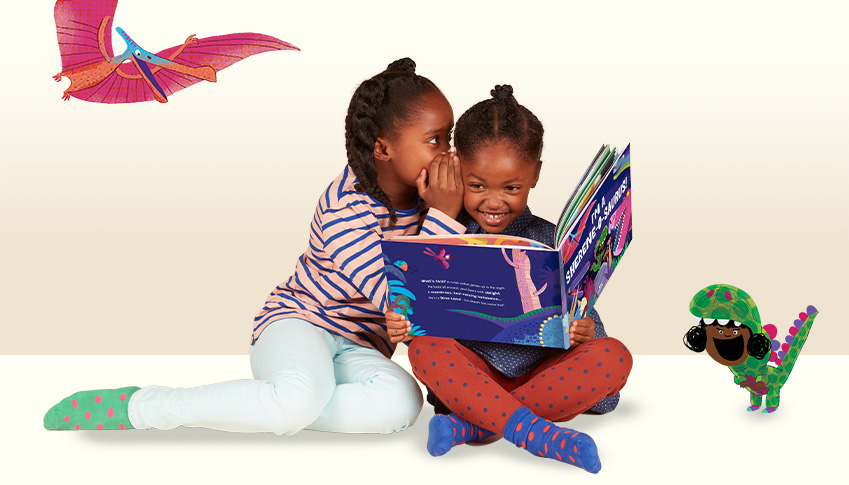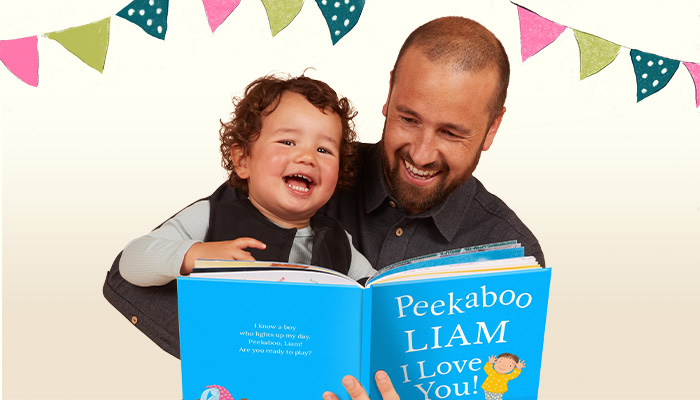It’s official: the benefits of reading aloud to children are huge, and sometimes surprising. OK, so we might be a teeny, tiny bit biased, but who are we to deny the evidence? Not only does it increase vocabulary, it forms the link between writing, reading and speaking which makes all the difference when it comes to overall literacy in the future.
Added to that, it aids with attention, openness, cognitive development and memory – and did we mention that it’s really fun? So, clear your throat, grab a drink, make yourself comfortable and get ready for your performance (once you’ve read all of the interesting stuff below, of course).

Bonding
Reading aloud with your child is one of the most magical forms of bonding, for both adults and children. Not only does it provide quality time together away from screens, it also forges deep personal connections through shared storytelling. You’ll no doubt remember the soothing feeling of being read to sleep, or the excitement of a brand new book at storytime; as well as the precious tales that became shared favorites.
A bigger vocabulary
Knowledge is power, and exposure is everything. Quite simply, the more words children hear, the more they have to work with. Studies say that just 20-minutes of reading each day exposes children to over 1.8 million words a year, which isn’t a bad start when it comes to forming the most supercalifrangalisticexpialidocious sentences ever as they get older.
Making the link between writing, reading and speaking
Children are pretty hands-on when it comes to learning, and the more obvious a connection is between an activity and an educational consequence, the better. That’s why showing them one-on-one (or one-on-five if you’re putting on a bit of a show) that the written code in the book, becomes a story in your mouth, is vital for that eureka moment of literacy realization.
It’s fun!
Education aside (sorry teachers) – we need to remember that stories are more than tools for other things, they’re just absolutely wonderful! Forget about trying to watch your child taking in life skills and simply lose yourself in the shared pleasure of a treasured book.
Attention, attention
They say that the average child’s attention span is the same as their age; e.g. three minutes for three years. That explains a lot, right? So if you can keep them enraptured for a whole five minutes while reading a book (and doing the voices!) then you’re doing fantastically. Like building up endurance for a run, start small and gradually increase the length. The longer that they can pay attention to the story is the longer that they can pay attention to anything, full stop. So really go for it, entertain, ask questions – make it memorable!

Cognitive development
For those who don’t know, cognition is essentially the art of thinking, knowing, remembering, judging and problem-solving. And yes, you guessed it, it plays a huge role in reading, both the in-your-head and out loud types. By reading aloud, you’re essentially posing lots of riddles for the child to solve, and they have to really work on those cognitive skills to make sense of everything they’re hearing. Similarly, as your reading sessions develop over time, introducing more complicated and unfamiliar words is a great way to keep working that grey matter.
Openness
Reading is unparalleled when it comes to creating a safe space to discuss emotions and big themes with loved ones – why else do you think so many grown-ups search for books to help explain sometimes scary things like divorce, death and identity? By reading these stories out loud, you’re already 50% of the way into a conversation that might be tricky to initiate out of the blue. And any personal circumstances can then be sensitively addressed via the natural questions that arise at storytime. This is invaluable when wanting to help children to be emotionally articulate and trusting of their grown-ups.
Memory and memories
Children love, love, love repetition, and while you may tire of reading the same book every day for two weeks at a time, it’s actually wonderful for them. Think of their minds as little tapes (yep, we’re getting analogue) and each time you go over the same story, it records not only the words, but the intention, action, and consequence. This isn’t only developmentally crucial for learning about concepts such as responsibility, it also encourages them to draw from their memory and build its strength, like a muscle. Which is helpful as they’ll be able to tell you where you left the keys before long. With that in mind, rhymes are particularly brilliant for getting stuck in everyone’s heads, and we have lots of personalized rhyming books to explore.
Curiosity and intrigue
More often than not, curiosity isn’t something that many children are lacking (thank goodness!) but team that with the added bonuses of boosting language, analytical and interpersonal skills and you’d think storytime was magic. Spoiler alert: it is. By encouraging children to hear the words and ask questions about anything they don’t understand, not only are you teaching them to use language to make sense of the world around them, you’re also encouraging them to literally use their voice, raise concerns, problem solve and interact with those around them. Pretty special, eh?
Roving Word Wizardess Favourite childhood book: The Selfish Giant by Oscar Wilde. My dad used to cry (he cries a lot at books) reading this to me, and now I get rather wet eyes reading it to my daughter. The illustrations are so beautiful, too. Most gifted Wonderbly book: The Wondrous Road Ahead. It manages to turn big conversations into magical moments that can be understood by little people. When I’m not reading I’m: Looking for fairies in the woods. They’re pretty sneaky but I’m determined to find them!
